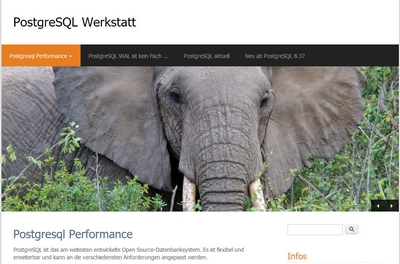Neues vom PostgreSQL Planet
Stefanie Janine: Switching PostgreSQL the conference calendars to Nextcloud
So far the conference calendars in https://proopensource.it/conference-calendar/ have been stored in Google Calendar.
As that is a foreign ressource, I decided to move them away from Google.
Hans-Juergen Schoenig: PostgreSQL storage: Comparing storage options
When it comes to designing and optimizing databases, one of the most critical aspects is the choice of storage options. PostgreSQL, like many other relational databases, provides various storage options that can significantly impact performance, data integrity, and overall database efficiency.
Ajin Cherian: Detection and resolution of conflicts in PostgreSQL logical replication
At this year’s PGConf.dev, the premier gathering for PostgreSQL contributors, developers, and community leaders, Zhijie Hou and I had the opportunity talk about the challenges and solutions around conflict handling in logical replication — a topic increasingly rele
Alexander Korotkov: OrioleDB beta12: features and benchmarks
Since our last public update, OrioleDB has continued to evolve with a series of new releases. These updates refine the core engine, extend functionality, and improve performance across a range of workloads. Together, they move us closer to a beta release and lay the groundwork for broader adoption.
Kaarel Moppel: TIL - Debian comes with a pg_virtualenv wrapper!
Andreas 'ads' Scherbaum: Dian Fay
Ian Barwick: PgPedia Week, 2025-07-13
PostgreSQL 18 beta2 is will likely be released on July 17th (Thursday): 18beta2 next week .
damien clochard: 20 Years of DALIBO: PostgreSQL and the Sense of the Community
The cooperative company DALIBO is celebrating its 20th anniversary today, giving me an opportunity to reflect on the reasons behind the success of this collective adventure.
Pavlo Golub: Contributions for the week of 2025-06-23 (Week 26)
PUG Stuttgart happened on June, 26th - hosted by Aleshkova Daria
Dian Fay: Fixing Slow Row-Level Security Policies
At my day job, we use row-level security extensively. Several different roles interact with Postgres through the same GraphQL API; each role has its own grants and policies on tables; whether a role can see record X in table Y can depend on its access to record A in table B, so these policies aren't merely a function of the contents of the candidate row itself. There's more complexity than that, even, but no need to get into it.
Two tables, then.
Vibhor Kumar: Microservices in Postgres
Vibhor Kumar and Marc Linster; last updated July 10 2025
Mankirat Singh: Worklog July 3-11, 2025
Ashutosh Bapat: Efficiency of a sparse hash table
When implementing an optimization for derived clause lookup myself, Amit Langote and David Rowley argued about the initial size of hash table (which would hold the clauses). See some discussions around this email on pgsql-hackers.
semab tariq: Replication Types and Modes in PostgreSQL
Data is a key part of any mission-critical application. Losing it can lead to serious issues, such as financial loss or harm to a business’s reputation. A common way to protect against data loss is by taking regular backups, either manually or automatically. However, as data grows, backups can become large and take longer to complete. If these backups are not managed properly or tested often, a sudden system crash could result in permanent data loss.
Jan Wieremjewicz: Active-active replication - the hidden costs and complexities
In Part 1 of this series, we discussed what active-active databases are and identified some “good” reasons for considering them, primarily centered around extreme high availability and critical write availability during regional outages. Now, let’s turn our attention to the less compelling justifications and the substantial challenges that come with implementing such a setup.
Tomas Vondra: So why don't we pick the optimal query plan?
Last week I posted about how we often don’t pick the optimal plan. I got asked about difficulties when trying to reproduce my results, so I’ll address that first (I forgot to mention a couple details). I also got questions about how to best spot this issue, and ways to mitigate this. I’ll discuss that too, although I don’t have any great solutions, but I’ll briefly discuss a couple possible planner/executor improvements that might allow handling this better.
Andreas 'ads' Scherbaum: Josef Machytka
Ian Barwick: PgPedia Week, 2025-07-06
PostgreSQL 19 development is now officially under way, so from now on any new features will be committed to that version. Any significant PostgreSQL 18 changes (e.g. reversions or substantial changes to already committed features) will be noted here separately (there were none this week).
PostgreSQL 19 changes this weekThe first round of new PostgreSQL 19 features is here:
Jan Kristof Nidzwetzki: Analyzing PostgreSQL Performance Using Flame Graphs
A flame graph is a graphical representation that helps to quickly understand where a program spends most of its processing time. These graphs are based on sampled information collected by a profiler while the observed software is running. At regular intervals, the profiler captures and stores the current call stack. A flame graph is then generated from this data to provide a visual representation of the functions in which the software spends most of its processing time. This is useful for understanding the characteristics of a program and for improving its performance.
Chris Ellis: PGDay UK 2025 - Schedule Published
We are excited to announce the schedule for PGDay UK 2025 has been published. We've got an exciting line up for talks over a range of topics. There will be something for everyone attending.
Take a look at what we have going on: https://pgday.uk/events/pgdayuk2025/schedule/
We'd like to extend our gratitude to the whole CFP team, who did an amazing job selecting the talks to make up the schedule.

